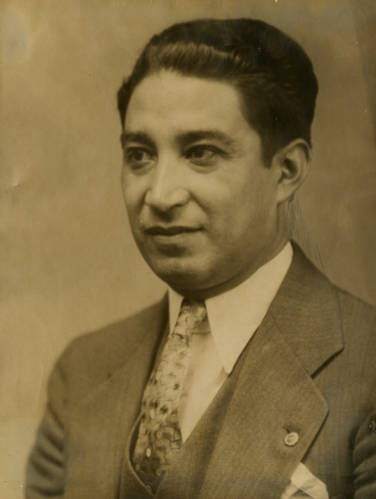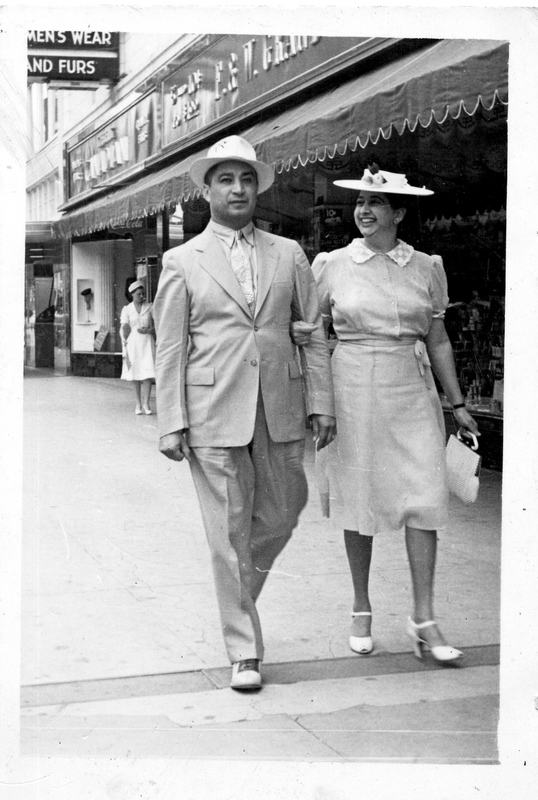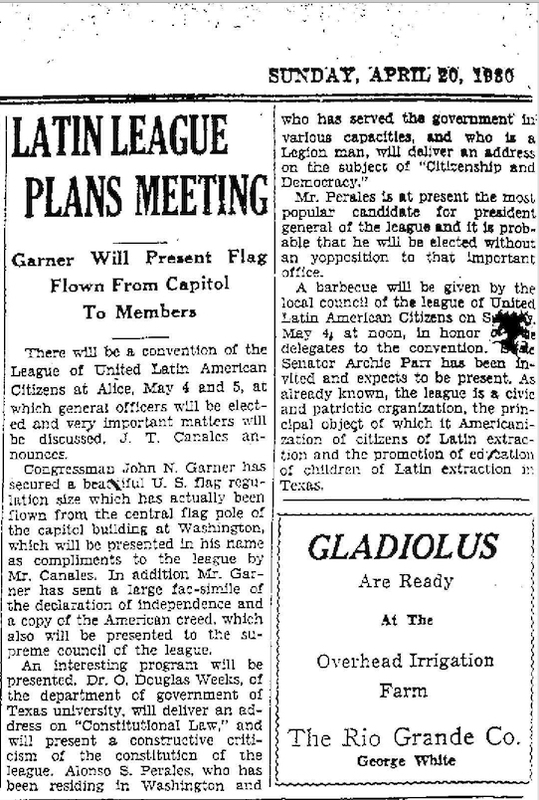About
Credits
USLDH Team
Gabriela Baeza Ventura, PhD
Carolina Villarroel, PhD, CA
Lorena Gauthereau, PhD
Digital Map Team
Lorena Gauthereau, PhD: project ideation, project manager, map visualization, metadata creation, data entry, scanning, web design
Theresa Mayfield, MLS: map visualization, metadata creation, data entry, scanning
Sonia Del Hierro: data entry, scanning
Sophia Martinez: data entry, scanning
All photographs from Recovering the US Hispanic Literary Heritage Digital Collections. usldhrecovery.uh.edu
Alonso S. Perales
Alonso S. Perales (1898-1960) was a co-founder of the League of United Latin American Citizens (LULAC) and one of the most prominent US civil rights leaders of the twentieth century. A native of Alice, Texas, Perales worked his whole life to uplift the working class trhough knowledge and education. An international figure, Perales served as a US diplomat in such Latin American countries as Cuba, Mexico, and Chile. For his civic achievements, Spain decorated Perales with the Medal of Civil Merit, one of that nation's highest honors.
Mexican American Civil Rights
Perales was especially interested in fighting for Mexican American civil rights. He founded the Independent Voters Association, a Mexican American political club in San Antonio, Texas. Perales also introduced legislation calling for the prohibition of racial discrimination against Mexican Americans.
The Alonso S. Perales Collection
In 2009, Marta Perales Carrizales and Raymond Perales donated their father's extensive personal papers to the University of Houston's Recovery Program. This collection-over 40 linear feet–contains correspondence, photographs, newspaper clippings, civil rights writings, and foundational documents related to LULAC. The online digital collection, available at usldhrecovery.uh.edu, includes a large sampling of these documents with full-text transcriptions and bilingual keywords for searches. The original Alonso S. Perales Papers are housed at the University of Houston Libraries Special Collections.
Correspondence Digital Project
The Alonso S. Perales Correspondence digital project visualizes the extent of Perales' national and international network using a sampling of his correspondence.
Citation
How to cite this project
This digital project is a product ofcollaboration at Recovering the US Hispanic Literary Heritage. To cite the digital project, we suggest the following citation:
Alonso S. Perales Correspondence. Recovering the US Hispanic Literary Heritage. https://recoveryapp.github.io/ASPcorrespondence.html. Accessed [DATE].
Recovering the US Hispanic Literary Heritage
Recovering the US Hispanic Literary Heritage (“Recovery”) is an international program to locate, preserve and disseminate Hispanic culture of the United States in its written form since colonial times until 1960. The program has compiled a comprehensive bibliography of books, pamphlets, manuscripts and ephemera produced by Latinos. The holdings available at the project include thousands of original books, manuscripts, archival items and ephemera, a microfilm collection of approximately 1,400 historical newspapers, hundreds of thousands of microfilmed and digitized items, a vast collection of photographs, an extensive authority list, and personal papers. In addition, the program has published or reprinted more than 40 historical books, two anthologies, and nine volumes of research articles. The program organizes a biennial international conference and has some five thousand affiliated scholars, librarians and archivists. Recovering the US Hispanic Literary Heritage is the premier center for research on Latino documentary history in the United States.
In the summer of 2019, The Andrew W. Mellon Foundation awarded a grant to the University of Houston to establish a first-of-its-kind US Latino Digital Humanities Program (USLDH) in the College of Liberal Arts and Social Sciences. The program will give scholars expanded access to a vast collection of written materials produced by Latinos and archived by theR ecovery program and UH’s Arte Público Press, the nation’s largest publisher of contemporary and recovered literature by Hispanic authors from the United States.
The USLDH program serves as a venue for scholarship focused on the US Latino written legacy that has been lost, absent, repressed or underrepresented. This program provides a physical space for the development, support and training in digital humanities projects using a vast collection of newspapers, photographs and digital materials; creates opportunities and facilities for digital publication of Latino-based projects and scholarship; promotes and fosters interdisciplinary scholarly work; provides a communal virtual space to share knowledge and projects related to Latino digital humanities; and establishes a Latino digital humanities hub.


